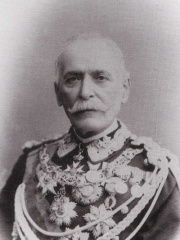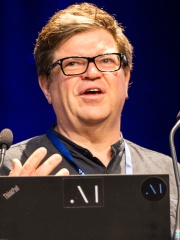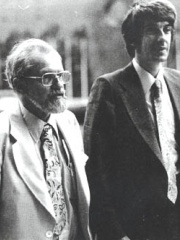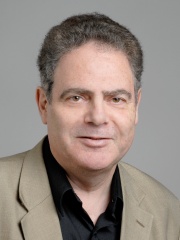





The Most Famous
COMPUTER SCIENTISTS from France
This page contains a list of the greatest French Computer Scientists. The pantheon dataset contains 245 Computer Scientists, 7 of which were born in France. This makes France the birth place of the 5th most number of Computer Scientists behind Canada, and Germany.
Top 7
The following people are considered by Pantheon to be the most legendary French Computer Scientists of all time. This list of famous French Computer Scientists is sorted by HPI (Historical Popularity Index), a metric that aggregates information on a biography's online popularity.

1. Luigi Federico Menabrea (1809 - 1896)
With an HPI of 63.62, Luigi Federico Menabrea is the most famous French Computer Scientist. His biography has been translated into 32 different languages on wikipedia.
Luigi Federico Menabrea (4 September 1809 – 24 May 1896), later made 1st Count Menabrea and 1st Marquess of Valdora, was an Italian statesman, general, diplomat, and mathematician who served as the seventh prime minister of Italy from 1867 to 1869.

2. Pierre Bézier (1910 - 1999)
With an HPI of 61.51, Pierre Bézier is the 2nd most famous French Computer Scientist. His biography has been translated into 23 different languages.
Pierre Étienne Bézier (French pronunciation: [pjɛʁ etjɛn bezje]; 1 September 1910 – 25 November 1999) was a French engineer and one of the founders of the fields of solid, geometric and physical modelling as well as in the field of representing curves, especially in computer-aided design and manufacturing systems. As an engineer at Renault, he became a leader in the transformation of design and manufacturing, through mathematics and computing tools, into computer-aided design and three-dimensional modeling. Bézier patented and popularized the Bézier curves and Bézier surfaces that are now used in most computer-aided design and computer graphics systems.

3. Yann LeCun (b. 1960)
With an HPI of 61.31, Yann LeCun is the 3rd most famous French Computer Scientist. His biography has been translated into 36 different languages.
Yann André Le Cun ( lə-KUN; French: [ləkœ̃]; usually spelled LeCun; born 8 July 1960) is a French–American computer scientist working in the fields of machine learning, computer vision, mobile robotics and computational neuroscience. He is the Jacob T. Schwartz Professor of Computer Science at the Courant Institute of Mathematical Sciences at New York University. He was Chief AI Scientist at Meta. He is well known for his work on optical character recognition and computer vision using convolutional neural networks (CNNs). He is also one of the main creators of the DjVu image compression technology, alongside Léon Bottou and Patrick Haffner. He co-developed the Lush programming language with Léon Bottou. In 2018, LeCun, Yoshua Bengio, and Geoffrey Hinton, received the Turing Award for their work on deep learning. The three are sometimes referred to as the "Godfathers of AI" and "Godfathers of Deep Learning".

4. Jacques Vallée (b. 1939)
With an HPI of 57.35, Jacques Vallée is the 4th most famous French Computer Scientist. His biography has been translated into 21 different languages.
Jacques Fabrice Vallée (French: [ʒak fabʁis vale]; born September 24, 1939) is an Internet pioneer, computer scientist, venture capitalist, author, ufologist and astronomer currently residing in San Francisco, California and Paris, France. His scientific career began as a professional astronomer at the Paris Observatory. Vallée co-developed the first computerized map of Mars for NASA in 1963. He later worked on the network information center for the ARPANET, a precursor to the modern Internet, as a staff engineer of SRI International's Augmentation Research Center (ARC) under Douglas Engelbart. Vallée is also an important figure in the study of unidentified flying objects (UFOs), and unidentified anomalous phenomena (UAPs). Vallée was first noted for his defense of the scientific legitimacy of the extraterrestrial hypothesis and later for promoting the interdimensional hypothesis.

5. Bertrand Meyer (b. 1950)
With an HPI of 54.15, Bertrand Meyer is the 5th most famous French Computer Scientist. Her biography has been translated into 18 different languages.
Bertrand Meyer (; French: [mɛjɛʁ]; born 21 November 1950) is a French academic, author, and consultant in the field of programming languages. He created the Eiffel language and the concept of design by contract.

6. Yoshua Bengio (b. 1964)
With an HPI of 53.01, Yoshua Bengio is the 6th most famous French Computer Scientist. His biography has been translated into 25 different languages.
Yoshua Bengio (born March 5, 1964) is a Canadian computer scientist, and a pioneer of artificial neural networks and deep learning. He is a professor at the Université de Montréal and co-president and scientific director of the nonprofit LawZero. He founded Mila, the Quebec Artificial Intelligence (AI) Institute, and was its scientific director until 2025. Bengio received the 2018 ACM A.M. Turing Award, often referred to as the "Nobel Prize of Computing", together with Geoffrey Hinton and Yann LeCun, for their foundational work on deep learning. Bengio, Hinton, and LeCun are sometimes referred to as the "Godfathers of AI". Bengio is the most-cited computer scientist globally (by both total citations and by h-index), and the most-cited living scientist across all fields (by total citations). In November 2025, Bengio became the first AI researcher with more than a million Google Scholar citations. In 2024, TIME Magazine included Bengio in its yearly list of the world's 100 most influential people.

7. Fabrice Bellard (b. 1972)
With an HPI of 40.98, Fabrice Bellard is the 7th most famous French Computer Scientist. His biography has been translated into 16 different languages.
Fabrice Bellard (French pronunciation: [fa.bʁis bɛ.laʁ]; born 1972) is a French computer programmer known for writing FFmpeg, QEMU, and the Tiny C Compiler. He developed Bellard's formula for calculating single digits of pi. In 2012, Bellard co-founded Amarisoft, a telecommunications company, with Franck Spinelli.
People
Pantheon has 7 people classified as French computer scientists born between 1809 and 1972. Of these 7, 5 (71.43%) of them are still alive today. The most famous living French computer scientists include Yann LeCun, Jacques Vallée, and Bertrand Meyer. The most famous deceased French computer scientists include Luigi Federico Menabrea, and Pierre Bézier. As of April 2024, 1 new French computer scientists have been added to Pantheon including Fabrice Bellard.
Living French Computer Scientists
Go to all RankingsYann LeCun
1960 - Present
HPI: 61.31
Jacques Vallée
1939 - Present
HPI: 57.35
Bertrand Meyer
1950 - Present
HPI: 54.15
Yoshua Bengio
1964 - Present
HPI: 53.01
Fabrice Bellard
1972 - Present
HPI: 40.98

